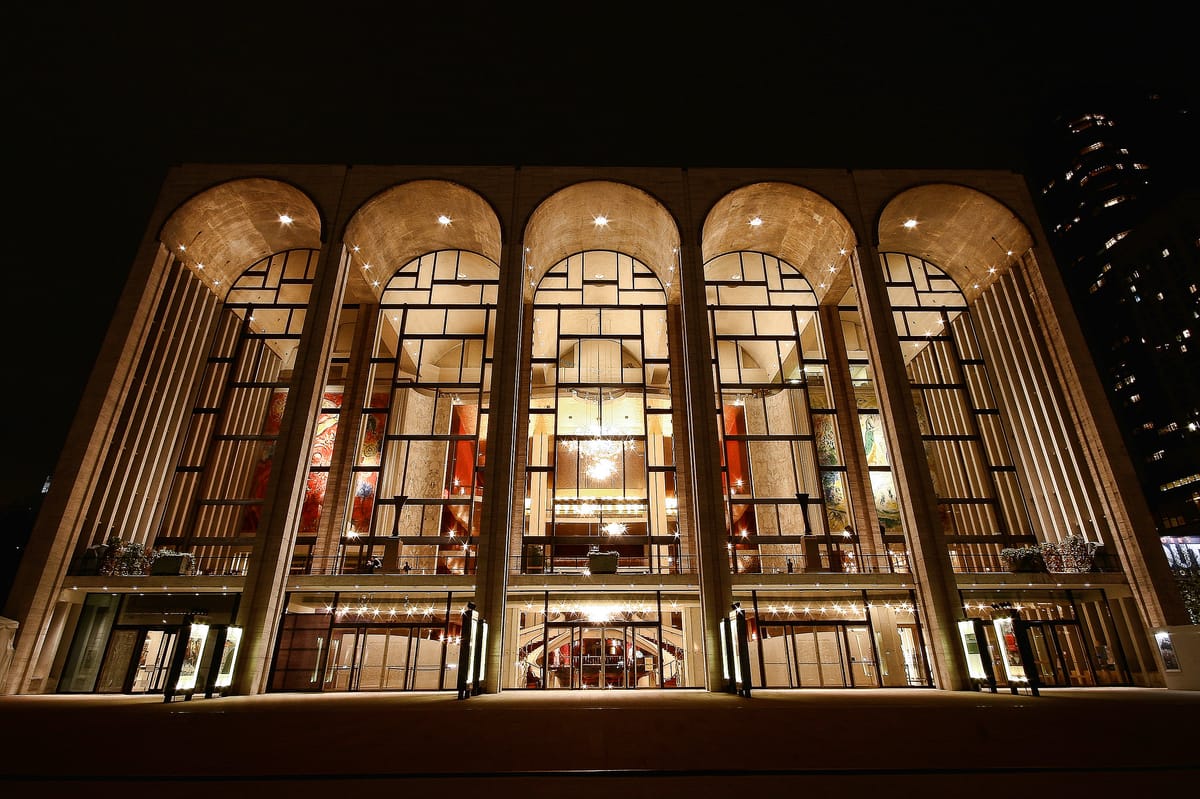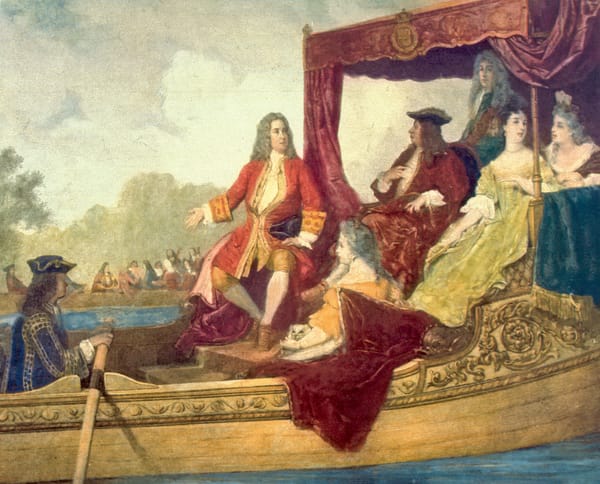Give me a Ring sometime!

I think it fair to say my dad was something of a Wagner fan. He had books about him in German, underlined and marked, with his own remarks scrawled all over the pages, as my dad was wont to do to anything he read. And he had stacks of spools of music (remember the huge spool-tape recorders? If you do, you’re “of a certain age”!) featuring several composers, but a formidable chunk of it was devoted to (and heavily labeled so), “Der Ring des Nibelungen” (The Ring of the Nibelungen), the cycle of four German-language epic music dramas composed by Richard Wagner (1813-1883), based loosely on Norse saga and the Nibelungenlied (song of the Nibelungs, an eleventh-century epic poem).
My dad was fortunate to be living in Germany (then West Germany) in the heady Herbert von Karajan era. Karajan was an ardent Wagner champion, and his recording of Wagner’s Ring with the Berliner Philharmoniker is a benchmark. I still envy the fact that my dad could go to so many live concerts in Karajan’s heyday in 1950s and 60s.
https://www.youtube.com/watch?v=dBi0YXM3zmI
One of the books my dad possessed actually had the libretto of the entire Ring cycle, in the Gothic font that a lot of German literature from that era used. The font can be headache-inducing at the best of times, still more so to the young child that I was in the 1970s, having to learn English, and the ability to read German beginning to atrophy from disuse as a result.
The spools didn’t weather well in our heat, voltage fluctuations here made them sound wonky, and the player would often get jammed. Daddy didn’t have as many Wagner LPs, and initially I hated the few that he did have. It took several listenings, out of sheer boredom on lazy afternoons, for some of it to grow on me, and these were largely orchestral music: overtures, preludes. The singing left me cold as a teenager. Come the cassette and CD era, and although my familiarity with Wagner grew, it was still largely orchestral excerpts. I played violin in Siegfied’s Idyll with the Bombay Chamber Orchestra, and Rienzi overture in Goa under Fr. Lourdino Barreto. In England, that orchestral exposure would widen considerably.
But even living in London, going to a Wagner opera wasn’t a priority. Opera in general is expensive (although I learned later how to get cheap tickets) and lengthy (so if you’ve just finished a long day’s work and are on-call the next morning, a symphony concert or chamber recital might be a saner option than opera). And Wagner operas are lengthier than most others.
There are so many jokes about the Ring cycle, in cartoons and sitcoms, about its length (over seventeen hours of music if you combine all four operas), and the number of characters (I counted 27 principal and secondary characters, not including choruses of slaves, attendants, Nibelung craftsmen, Valkyries) that it can be off-putting, a significant barrier to even dipping your toe in the Rhine saga.
Cut now to our blessed lockdown. When not obsessing about food supply chains, the principal thing that keeps me from tearing my hair out is the feast of music on offer online, for free!
I hadn’t thought I’d get hooked to the Metropolitan Opera, but it’s become a daily ritual, internet connection permitting, of course (thank you, Gwave!). At the time of writing, I’ve notched up twenty operas on as many consecutive days. And counting!
In the middle of this, the Met inserted a whole week devoted to Wagner, the highlight of which was the Ring cycle: Das Rheingold (the Rhinegold), Die Walküre (the Valkyrie), Siegfried and Götterdämmerung (the Twilight of the Gods).
Initially I balked. But then, it seemed that the Universe, or the music gods, were sending me a message: When would I ever get the time and opportunity to give the Ring a proper listen? These were fantastic productions, featuring Wagnerian stalwart singers (Bryn Terfel, Jonas Kaufman, Deborah Voigt, Eric Owens) and conductors (James Levine, Fabio Luisi). Spellbinding staging and set design. And I really had nowhere to go.
To my own surprise, I was smitten. It helped that I could follow a lot of the sung German, and I had the option of English surtitles anyway.
Everything about the Ring is over-the-top: the sinuous plot, the demands not only on the singers and orchestra but also on set design and costumes.
Very briefly, gold at the bottom of the Rhine river (Rheingold) guarded by Rhinemaidens is stolen by Nibelung dwarf Alberich (paying the price of forever renouncing love) and forged into a magic ring that grants the power to rule the world. When it is taken from him by Wotan, chief of the gods, to pay for the construction of their home Valhalla, Alberich casts a curse upon the ring. Long story short, everyone fights to possess it, but is doomed from the moment they do.
The plotline is peppered with incestuous love (Siegmund and Sieglinde are offspring of Wotan; their union produces the archetypal hero Siegfried), stuff-of-legend love (Siegfried and the Valykrie Brünnhilde, who also happens to be Wotan’s daughter, so technically also Siegfried’s ‘step-aunt’, but never mind that; it inspired some of the most romantic music ever written), and leitmotifs of themes for almost every important character, prop (Siegfried’s sword, the magic ring, helmet) and emotion (love, hate, jealousy, anger, betrayal). Often the orchestra plays the leitmotifs in advance of the drama, so the listener can anticipate what will happen next before the characters themselves.
The saga ends with the downfall of Valhalla and the gods with the death of Siegfried through the convoluted actions of Wotan himself, and the ring descends back to the depths of the Rhine where it rightfully belongs.
It provokes much food for thought. The operas celebrate the gods, and we the audience root for them, but it is the Nibelungs, the inhabitants of the darkest caverns of the Earth, that are enshrined in the title. How much purer is Wotan’s agenda to Alberich’s? Wotan seems as fallible, vacillating and weak as any mortal. Was renouncing love a price worth paying by Alberich for the ring? Are power and love at opposing poles of the human experience? What sort of a hero is Siegfried if he can forget his ‘eternal’ love for Brünnhilde so easily? What did Brünnhilde gain by joining him in death? Will a post-Valhalla world be better or worse?
The ring can be and has been interpreted as symbolic of many things, greed and capitalism prominent among them. Wagner’s rabid anti-Semitism and Hitler’s admiration for his work have quite understandably alienated many from his music. But one has to acknowledge, perhaps grudgingly, Wagner’s genius in conceiving such a larger-than-life drama, writing not just the music but also the libretto for his operas, designing not just sets and costumes but a whole purpose-built theatre in Bayreuth, revolutionizing and forever changing the face of music, theatre and spectacle. Someday, in a post-COVID-19 world, I’d love to visit Bayreuth and be swept away by the magic.
If the Universe decides to give you a Ring, take the call. You won’t regret it.
This article first appeared in The Navhind Times





